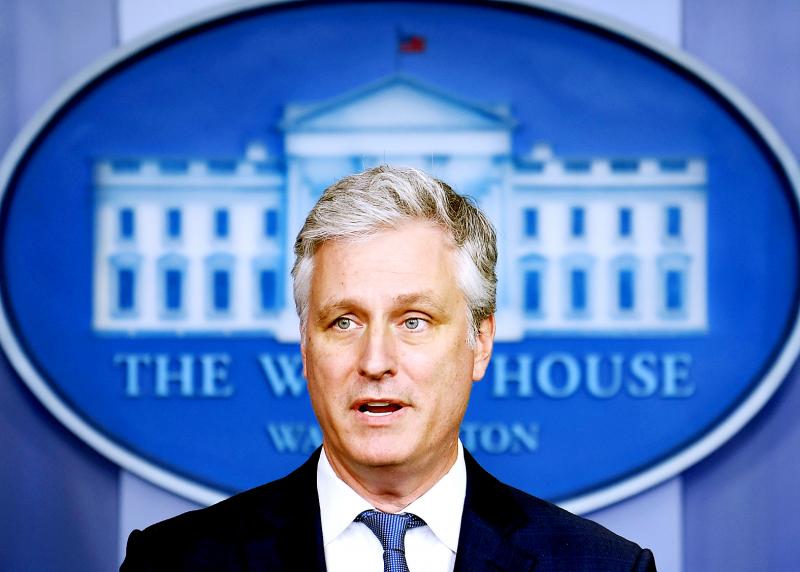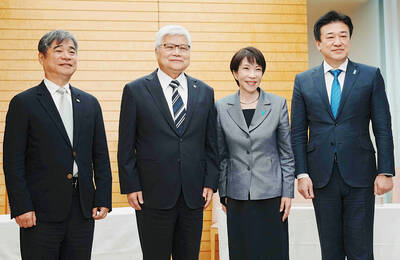A top White House official on Friday urged Taiwan to build up its military capabilities to protect against a possible invasion by China, saying that Beijing would have that ability in 10 to 15 years.
US President Donald Trump’s National Security Adviser Robert O’Brien told the Aspen Security Forum that a missile attack by China against Taiwan would be much too destructive.
An amphibious attack is a possibility, although at the moment it is beyond China’s capability, he said.

Photo: AFP
However, China could combine that threat with “gray zone” operations, embargoes, harassment and other actions to intimidate the nation if Taipei does not build up its defense, O’Brien said.
“What we told our Taiwanese friends is knowing all this, whether there’s an amphibious landing, a missile attack, a gray-zone-type operation, they really need to fortify themselves,” he said.
“Taiwan needs to start looking at some asymmetric and anti-access area-denial strategies ... and really fortify itself in a manner that would deter the Chinese from any sort of amphibious invasion or even a gray zone operation against them,” O’Brien said.
China has stepped up pressure against Taiwan over the past year, sending attack and surveillance aircraft into its airspace and ships near its waters.
Earlier this week, Beijing released video of a military exercise simulating an invasion featuring missiles and amphibious landings.
At the same time, news reports said that Taiwan was close to buying missile systems from the US.
For decades, Taiwan’s security has relied in part on close relations with the US, but there has always been ambiguity over whether Washington would intervene and defend the nation if China attacks.
While China has a large number of missiles pointed at Taiwan, O’Brien said that he did not think Beijing currently wants to attack Taiwan.
“I don’t know what they would gain from that,” he said. “If they did that, maybe they would certainly become pariahs internationally for just the wanton destruction of Taiwan.”
Pointing to China’s massive naval buildup, he said: “Maybe in 10 or 15 years, they’d be in better shape to do it.”
Defense News this week reported that the US is planning to sell several arms systems, including missiles and Reaper drones, to Taiwan.

Right-wing political scientist Laura Fernandez on Sunday won Costa Rica’s presidential election by a landslide, after promising to crack down on rising violence linked to the cocaine trade. Fernandez’s nearest rival, economist Alvaro Ramos, conceded defeat as results showed the ruling party far exceeding the threshold of 40 percent needed to avoid a runoff. With 94 percent of polling stations counted, the political heir of outgoing Costa Rican President Rodrigo Chaves had captured 48.3 percent of the vote compared with Ramos’ 33.4 percent, the Supreme Electoral Tribunal said. As soon as the first results were announced, members of Fernandez’s Sovereign People’s Party

EMERGING FIELDS: The Chinese president said that the two countries would explore cooperation in green technology, the digital economy and artificial intelligence Chinese President Xi Jinping (習近平) yesterday called for an “equal and orderly multipolar world” in the face of “unilateral bullying,” in an apparent jab at the US. Xi was speaking during talks in Beijing with Uruguayan President Yamandu Orsi, the first South American leader to visit China since US special forces captured then-Venezuelan president Nicolas Maduro last month — an operation that Beijing condemned as a violation of sovereignty. Orsi follows a slew of leaders to have visited China seeking to boost ties with the world’s second-largest economy to hedge against US President Donald Trump’s increasingly unpredictable administration. “The international situation is fraught

Taiwan Semiconductor Manufacturing Co (TSMC, 台積電) plans to make advanced 3-nanometer chips in Japan, stepping up its semiconductor manufacturing roadmap in the country in a triumph for Japanese Prime Minister Sanae Takaichi’s technology ambitions. TSMC is to adopt cutting-edge technology for its second wafer fab in Kumamoto, company chairman C.C. Wei (魏哲家) said yesterday. That is an upgrade from an original blueprint to produce 7-nanometer chips by late next year, people familiar with the matter said. TSMC began mass production at its first plant in Japan’s Kumamoto in late 2024. Its second fab, which is still under construction, was originally focused on

GROWING AMBITIONS: The scale and tempo of the operations show that the Strait has become the core theater for China to expand its security interests, the report said Chinese military aircraft incursions around Taiwan have surged nearly 15-fold over the past five years, according to a report released yesterday by the Democratic Progressive Party’s (DPP) Department of China Affairs. Sorties in the Taiwan Strait were previously irregular, totaling 380 in 2020, but have since evolved into routine operations, the report showed. “This demonstrates that the Taiwan Strait has become both the starting point and testing ground for Beijing’s expansionist ambitions,” it said. Driven by military expansionism, China is systematically pursuing actions aimed at altering the regional “status quo,” the department said, adding that Taiwan represents the most critical link in China’s